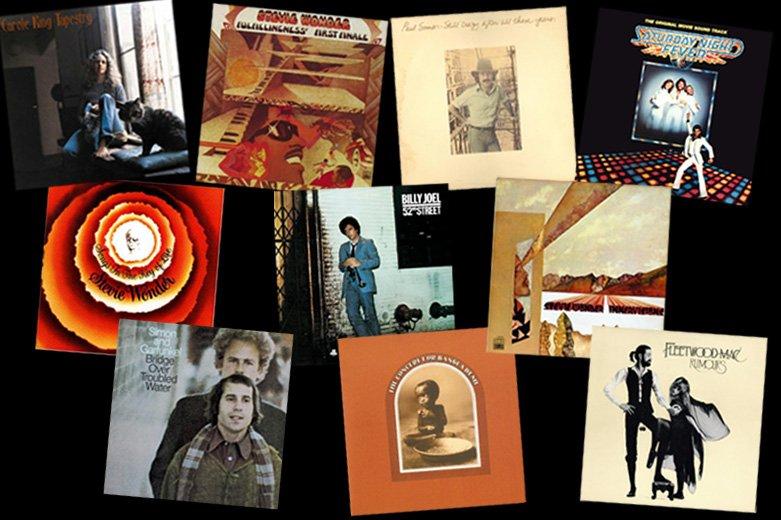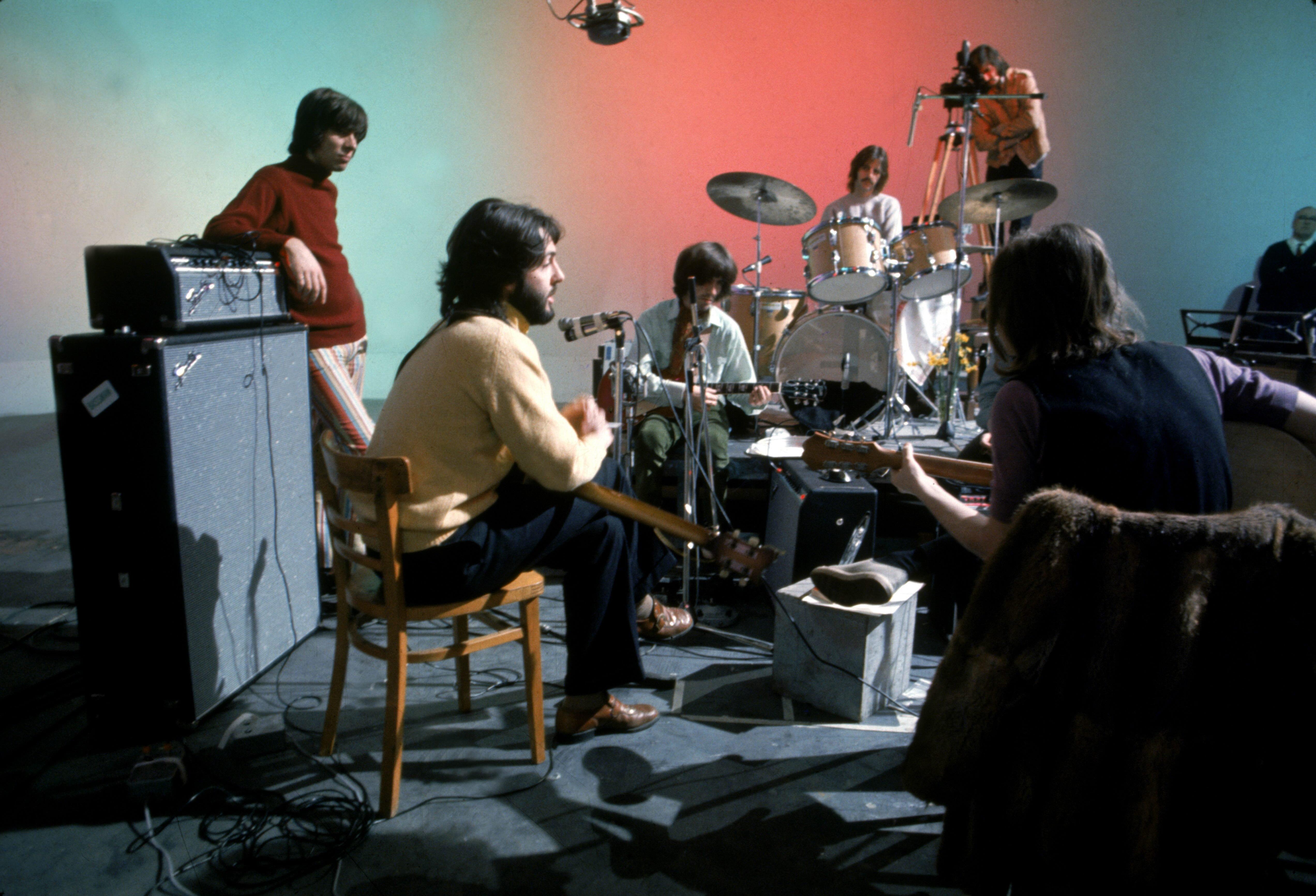An incalculable number of albums have been released in music history, but only 58 have earned the coveted distinction of Album Of The Year GRAMMY winner so far. From Henry Mancini's The Music From Peter Gunn to Taylor Swift's 1989, some of these elite albums have arguably surprised, some were seemingly consensus choices and still others have fostered lasting debate. In part two of Album Of The Year GRAMMY Winners, explore the albums that won — and were runners-up for — music's biggest prize for the 1970s.
1970 ALBUM OF THE YEAR
Bridge Over Troubled Water
Simon And Garfunkel
Simon And Garfunkel's final studio album is by far their most adventurous. With a mix of anthemic songs of support such as "Bridge Over Troubled Water," frivolous love songs ("Cecilia") and plaintive folk ballads ("El Condor Pasa [If I Could]" and "The Boxer"), Bridge Over Troubled Water would become one of the duo's biggest sellers. In total, the album and tracks from it won six GRAMMYs, including Song and Record Of The Year. Despite its reassuring title track, the duo was in the midst of breaking up during the recording of the album.
Other Nominees:
Close To You, Carpenters
Chicago, Chicago
Déjà Vu, Crosby, Stills, Nash & Young
Elton John, Elton John
Sweet Baby James, James Taylor
1971 ALBUM OF THE YEAR
Tapestry
Carole King
This year, a classic singer/songwriter bested rock, pop, funk/soul, and a blessed Broadway show. After becoming one of the most successful Brill Building songwriters along with her then-husband and creative partner, Gerry Goffin — with confections including "Will You Love Me Tomorrow," "One Fine Day" and "Up On The Roof," among many others — Carole King's first attempts at a solo career were quietly received. But Tapestry became a benchmark recording in the singer/songwriter realm, staying on the charts for nearly six years and selling 10 million copies. King's songs on Tapestry (including Record Of The Year "It's Too Late," Song Of The Year "You've Got A Friend," "I Feel The Earth Move," and the King/Goffin/Wexler cut "[You Make Me Feel Like] A Natural Woman") are exquisitely written and undeniably compelling.
Other Nominees:
Carpenters, Carpenters
All Things Must Pass, George Harrison
Shaft, Isaac Hayes
Jesus Christ Superstar, London Production, Producers: Andrew Lloyd Webber, Tim Rice
1972 ALBUM OF THE YEAR
The Concert For Bangla Desh
Various Artists
The triple-LP live album The Concert For Bangla Desh was one of the first culturally significant all-star charity recordings. Proceeds from the record and concert film — which continue to this day, thanks to a 2005 re-release on DVD and availability via iTunes and Spotify — went to UNICEF to benefit the Bengali homeless and poor, many suffering as a result of the 1971 war between India and Pakistan. The concert organizer, George Harrison, was made aware of the dire Bengali situation through his friendship with Indian sitar player Ravi Shankar. With participation from A-listers such as Bob Dylan, Eric Clapton, Billy Preston, Leon Russell, and Beatlemate Ringo Starr, the success of the concert would be a precursor to such efforts as Band Aid and USA For Africa.
Other Nominees:
Moods, Neil Diamond
American Pie, Don McLean
Nilsson Schmilsson, Harry Nilsson
Jesus Christ Superstar, Original Broadway Cast, Producers: Tom Morgan, Tim Rice, Andrew Lloyd Webber
1973 ALBUM OF THE YEAR
Innervisions
Stevie Wonder
Innervisions comprises nine songs, but even today they stand out as examples of Stevie Wonder's deft ability to tackle religion, social issues and politics within a pop palette. Showcasing his multitalented songwriting and arranging skills, "Higher Ground," "Living For The City" (a GRAMMY winner for Best Rhythm & Blues Song), "Don't You Worry 'Bout A Thing," and "He's Misstra Know It All" (aimed at then-President Richard Nixon) are astute observations of '70s social issues.
Other Nominees:
Killing Me Softly With His Song, Roberta Flack
The Divine Miss M, Bette Midler
Behind Closed Doors, Charlie Rich
There Goes Rhymin' Simon, Paul Simon
1974 ALBUM OF THE YEAR
Fulfillingness' First Finale
Stevie Wonder
Fulfillingness' First Finale, the second of Stevie Wonder's consecutive Album Of The Year wins, sits near the end of what is often considered his "classic period" of releases (Music Of My Mind, Talking Book, Innervisions, …Finale, and Songs In The Key Of Life). Moving in a different, more relationship-oriented direction than Innervisions, Wonder still takes another swing at President Nixon ("You Haven't Done Nothin'") with a little backing help from the Jackson 5. Still, African-Americans' outrage at a relatively unchanged post-'60s social scene was well represented at the GRAMMYs this year: Richard Pryor took home Best Comedy Recording for That N*****'s Crazy.
Other Nominees:
Back Home Again, John Denver
Caribou, Elton John
Band On The Run, Paul McCartney And Wings
Court And Spark, Joni Mitchell
1975 ALBUM OF THE YEAR
Still Crazy After All These Years
Paul Simon
Flush with some of his most accessible pop hits ("50 Ways To Leave Your Lover," "My Little Town" [featuring Art Garfunkel] and the title track), Still Crazy After All These Years was Paul Simon's third solo studio release after splitting with Garfunkel. By now, Simon and Stevie Wonder were in their '70s prime, duking it out almost yearly for best album in the eyes of the public and The Recording Academy Voting members. Memorably, Simon, in accepting his award, thanked Wonder for not releasing an album that year. Wonder would have the last laugh the next year.
Other Nominees:
One Of These Nights, Eagles
Between The Lines, Janis Ian
Captain Fantastic And The Brown Dirt Cowboy, Elton John
Heart Like A Wheel, Linda Ronstadt
1976 ALBUM OF THE YEAR
Songs In The Key Of Life
Stevie Wonder
Songs In The Key Of Life, a double-LP collection considered by many to be the quintessential Stevie Wonder recording, tackles freedom ("Black Man"), politics ("Village Ghetto Land"), the future ("Saturn"), a father's love ("Isn't She Lovely"), and the powerful emotions behind them all. And 13 years after his Motown splash, The 12 Year Old Genius, this album finds Wonder at his most prolific in terms of experimentation and creativity. In all, Songs … would garner Wonder five GRAMMY wins, including Best Producer Of The Year honors.
Other Nominees:
Breezin', George Benson
Chicago X, Chicago
Frampton Comes Alive!, Peter Frampton
Silk Degrees, Boz Scaggs
1977 ALBUM OF THE YEAR
Rumours
Fleetwood Mac
Fleetwood Mac's Rumours marked the group's only GRAMMY. Following their blues-rock beginnings, it is the band's second release after the addition of young California-based singer/songwriters Lindsey Buckingham and Stevie Nicks. Many of the album's songs are clearly steeped in the varying emotions resulting from incendiary internal relationships. The turmoil and strife proved to be bittersweet. (To this day, Rumours is among the most lauded and top-selling albums of all time.) "Don't Stop," "The Chain," "Dreams," and "Gold Dust Woman" were breakout songs, and Buckingham's unique guitar stylings shine throughout this landmark recording.
Other Nominees:
Hotel California, Eagles
Aja, Steely Dan
JT, James Taylor
Star Wars — Motion Picture Soundtrack, John Williams, Producer: George Lucas
1978 ALBUM OF THE YEAR
Saturday Night Fever — Motion Picture Soundtrack
Various Artists
During the mid-'70s, many of the sounds wafting out of car radios and club doors were clearly influenced by R&B and its dance floor cousin, disco. The big winners at the 21st Annual GRAMMYs included Best New Artist A Taste Of Honey, Donna Summer, Earth, Wind & Fire, and the soundtrack to the most popular film of 1977. Both the film and the accompanying soundtrack to Saturday Night Fever created a pop culture supernova. A third of the songs were composed and performed by the Bee Gees (including "Stayin' Alive," "How Deep Is Your Love," "More Than A Woman," and "Night Fever"). Other artists on the soundtrack read like a short list of disco royalty, including Yvonne Elliman (singing another silky Gibbs composition, "If I Can't Have You"), Kool & The Gang, Tavares, the Trammps, and KC & The Sunshine Band.
Other Nominees:
Running On Empty, Jackson Browne
Even Now, Barry Manilow
Some Girls, the Rolling Stones
Grease — Motion Picture Soundtrack, Various Artists
1979 ALBUM OF THE YEAR
52nd Street
Billy Joel
Coming off wins for Record Of The Year and Song Of The Year for "Just The Way You Are" from his 1977 breakout album The Stranger, Billy Joel had a lot riding on 52nd Street. But with its win for Album Of The Year, Joel captured three of the most prestigious GRAMMYs inside two years. The title and slight jazz undercurrents on the album (produced by Phil Ramone) are a nod to the New York City street renowned for its jazz clubs and glitzy nightlife. Catapulted by songs such as "Big Shot," "Honesty," "My Life," the ode to Phil Spector Brill Building pop "Until The Night," and "Zanzibar" (the latter featuring bright trumpet accompaniment by Freddie Hubbard and vibes by Steps Ahead's Mike Mainieri), 52nd Street was also Joel's first No. 1 album.
Other Nominees:
Minute By Minute, the Doobie Brothers
The Gambler, Kenny Rogers
Bad Girls, Donna Summer
Breakfast In America, Supertramp



.webp)






